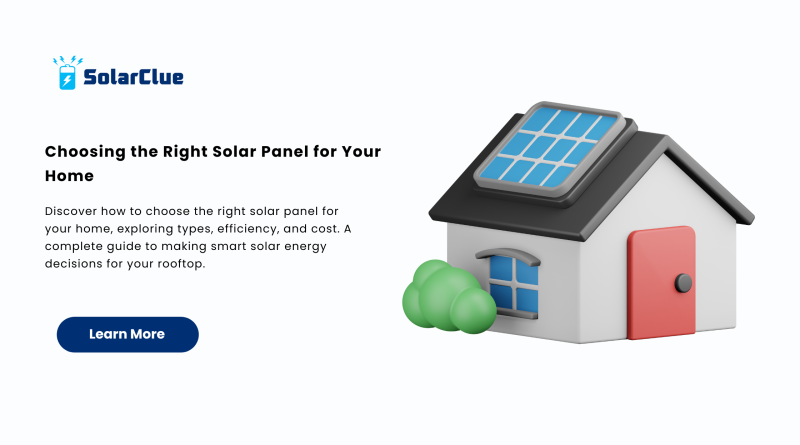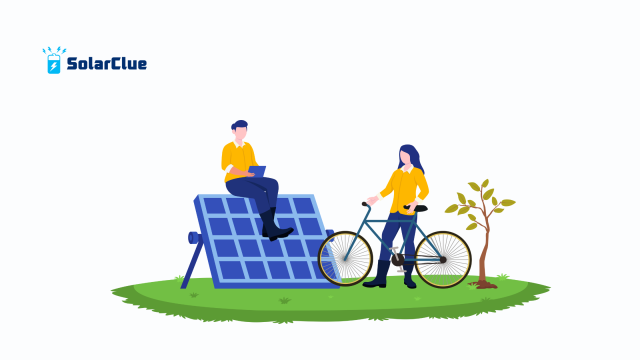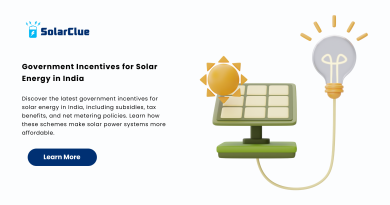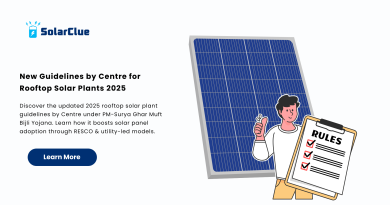Choosing the Right Solar Panel for Your Home
With rising electricity costs and increasing awareness about clean energy, more homeowners in India are turning to solar energy. But with so many options available, choosing the right solar panel for your home can be overwhelming. From understanding the types of panels to evaluating efficiency, warranties, and price, this guide will walk you through everything you need to know to make an informed decision.
Table of Contents
- 1 Why Go Solar?
- 2 Types of Solar Panels for Residential Use
- 3 Key Factors to Consider When Choosing Solar Panels
- 4 How to Calculate the Number of Solar Panels You Need
- 5 On-Grid vs Off-Grid Solar Systems
- 6
- 7 Best Solar Panels for Indian Homes in 2025
- 8 Government Subsidies and Support
- 9 Installation Tips for Solar Panels
- 10 Common Mistakes to Avoid
- 11 Is Solar Right for You?
- 12 FAQs
Why Go Solar?
Switching to solar power system is no longer just an eco-friendly choice—it’s a financially smart move too. A properly sized and well-installed solar panel setup can reduce your monthly electricity bills by up to 90%, increase the value of your home, and contribute to a sustainable future.
Types of Solar Panels for Residential Use
When selecting a solar panel for home, understanding the different types is crucial:
1. Monocrystalline Solar Panels
These are made from single-crystal silicon and are known for their high efficiency and sleek black design. They perform well in limited space and are ideal for rooftops with space constraints.
2. Polycrystalline Solar Panels
These panels are made from multiple silicon fragments melted together. They are slightly less efficient than monocrystalline but are more budget-friendly, making them a popular choice in Indian homes.
3. Thin-Film Solar Panels
Lightweight and flexible, these are less efficient but can be useful for certain applications. They’re not the top choice for rooftops where space and efficiency matter most.
Key Factors to Consider When Choosing Solar Panels
1. Efficiency
The efficiency of a solar panel refers to how much sunlight it can convert into usable electricity. Higher efficiency means more energy output from less space. For most homeowners, panels with 17–22% efficiency are ideal.
2. Wattage and Output
Standard residential solar panels typically range between 300W to 550W. The more wattage per panel, the fewer panels you’ll need.
3. Durability and Warranty
Look for solar panels that come with at least a 25-year performance warranty. This ensures long-term value and trust in your investment.
4. Manufacturer Reputation
Choose trusted brands that offer strong after-sales service and have a proven track record in the solar energy market.
5. Budget and ROI
While upfront costs might seem high, the long-term savings and return on investment (ROI) are significant. Government subsidies can also help reduce your initial expense.
How to Calculate the Number of Solar Panels You Need
Before purchasing, calculate your home’s average monthly electricity usage in kilowatt-hours (kWh). A typical Indian household consumes around 200–300 units per month. Divide this by the daily solar production capacity in your area to estimate the number of panels required.
Example:
-
Monthly usage: 300 units
-
Daily usage: 10 units
-
Panel wattage: 330W
-
Daily generation per panel: ~1.3 units
-
Panels needed: 8–9
This varies based on sunlight availability, location, and panel efficiency.
On-Grid vs Off-Grid Solar Systems
On-Grid Solar System
Connected to the government grid, allowing you to use solar electricity and send excess power back. Ideal for areas with consistent grid power. Net metering can help you earn credit for surplus power.
Off-Grid Solar System
Standalone systems with battery storage. Best for remote areas with unreliable grid supply, but they cost more due to the battery bank requirement.
Best Solar Panels for Indian Homes in 2025
Here are some high-performing and trusted brands:
-
Adani Solar
-
Tata Power Solar
-
Loom Solar
-
Vikram Solar
-
Waaree Energies
These brands offer high-efficiency solar panels with robust warranties and reliable support.
Government Subsidies and Support
Under India’s PM Surya Ghar Yojana, homeowners can avail subsidies up to ₹78,000 for installing rooftop solar panels. Visit your local DISCOM or apply through the official MNRE portal for subsidy benefits.
Installation Tips for Solar Panels
-
Ensure your rooftop is south-facing and receives full sunlight
-
Avoid shaded areas from trees or buildings
-
Hire a certified installer for proper mounting, wiring, and alignment
-
Regularly clean and maintain your panels to maximize output
Common Mistakes to Avoid
-
Choosing based only on price and ignoring efficiency
-
Not checking for certification and warranty
-
Installing without assessing rooftop strength
-
Ignoring the role of solar power system design and inverter compatibility
Is Solar Right for You?
If you live in a location with good sunlight (most parts of India do), have high power bills, and plan to stay in your home for several years, investing in a solar panel for home is a smart decision. Not only will you save money, but you’ll also be doing your part for the planet.
FAQs
Q1: How much does it cost to install solar panels at home in India?
A typical 3kW solar power system can cost between ₹1.5–2 lakh after subsidies. Prices vary by brand and location.
Q2: Will solar panels work during cloudy weather or at night?
Solar panels still generate electricity on cloudy days, though at reduced efficiency. At night, you either use stored battery power (off-grid) or draw from the grid (on-grid).
Q3: How long do solar panels last?
Most solar panels come with 25–30 years of performance warranty and can last even longer with proper care.
Q4: Do I need batteries with my solar panel system?
Not necessarily. If you install an on-grid system with net metering, you can function without batteries. However, off-grid systems require batteries to store energy.
Q5: How do I maintain my solar panel system?
Clean the panels once every 15–30 days, ensure the inverter is functioning properly, and schedule periodic checks with your installer.
Conclusion
Choosing the right solar panel for your home is a long-term investment that pays off financially and environmentally. By understanding your energy needs, evaluating panel types, and comparing features, you can make an informed decision that brings decades of clean energy and savings.
Ready to take the next step? Explore our expert-curated solar solutions at solarclue.com or dive deeper into the world of solar at blog.solarclue.com—your trusted companion in your solar journey.




